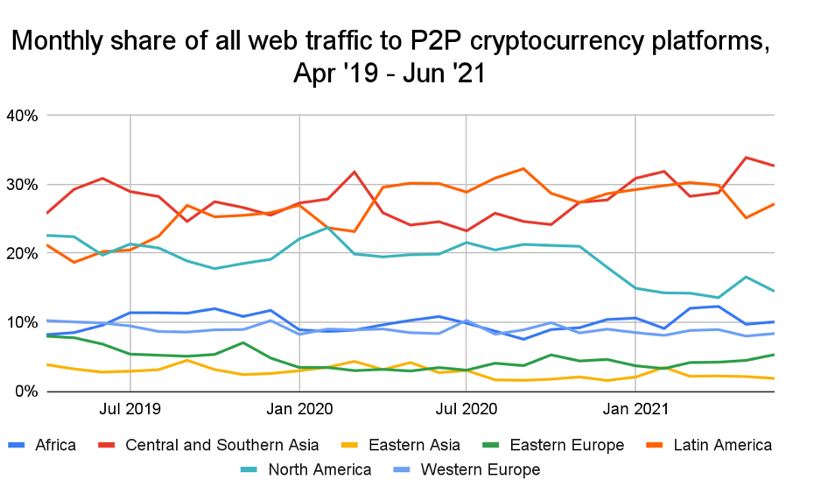Last week the European Parliament voted to advance a version of the Markets in Crypto Assets (MiCA) Bill. The chosen version omitted language that would have effectively banned proof of work-based cryptocurrencies. This has fuelled the ongoing debate about whether cryptocurrencies consume too much energy – but what is missing from that debate is an appreciation of the societal merit of crypto.
Most Western elites, investors, and journalists on either side of the crypto-energy debate approach this issue from a privileged developed market perspective. But if we take a step back and look globally, privileged, developed and free societies account for only 20 percent of the global population. From the current world population of 7.9 billion, only 1.4 billion people have access to the basic tenets of a liberal democracy: freedom of expression and belief, private property, and a relatively stable economic system.
Crypto helps address a lack of economic freedom
The rest of the world's population live in partly-free societies or under some form of authoritarianism, with little to no equal protection of human rights, civil liberties, and political and economic freedoms. Crypto fundamentally addresses a lack of economic freedom. Globally there are 1.2 billion people who live under hyperinflation, with many using crypto to remedy this. In emerging economies like Kenya, Vietnam, Venezuela, and Brazil, for example, the cost and bureaucracy of legacy financial systems, unstable monetary governance, and currency devaluation drive many people to adopt cryptocurrencies in order to preserve their savings, send and receive remittances, purchase basic goods and carry out business transactions. Brazil is the leading country in Latin America for cryptocurrency users, with 10.4 million people recognizing crypto as an essential tool of economic and social value to their lives.

In emerging economies like Kenya, Vietnam, Venezuela, and Brazil, the cost and bureaucracy of legacy financial systems, unstable monetary governance, and currency devaluation drive many people to adopt cryptocurrencies
With the advent of crypto, for the first time, people who do not fall within the 20 percent have a choice. They can choose to participate in an alternative economic system that enables greater financial empowerment and independence. To dismiss this reality is to underestimate crypto’s economic and social value.
A non-Western viewpoint
We must remember this context of crypto’s value in non-western societies when we discuss crypto’s energy footprint. Crypto uses energy to provide an alternative, borderless and decentralized store of value. In order for crypto to be all of those things, it needs to be transparently distributed to the rest of the world. To achieve this, Bitcoin's pseudonymous creator Satoshi Nakamoto invented 'proof of work', which is an algorithmic method of distribution that burns energy in order to obtain new cryptocurrencies in return. So crypto's energy consumption is not accidental; it has a specific purpose. For one, it achieves continuity in the ledger without enlisting an intermediary or any centralized authority. Secondly, it ensures that new units of cryptocurrencies are fairly distributed to the rest of the world. Just like any utility, crypto is purchased to ultimately serve a particular objective.
In general terms, utilities are accepted as they add value to society. Their energy consumption becomes less a question of morality than one of basic human necessity. For example, household tumble dryers in the U.S. consume 108 TWh of energy a year, while Bitcoin uses 62 TWh a year. The graph below illustrates similar comparisons with other socially-accepted utilities, such as data centers which give us access to Netflix and popular gaming platforms such as Playstation, for example.
![MkAaT5oXSnHX0gJ-lsusZ8bh4tVB1tN1ZKC60Pp--dc[1].png](/images/digitalhublibraries/articles-categories/06e4c830-adc6-4b7b-956b-946a2baa24b5.png?sfvrsn=c0a434d0_2)
Household tumble dryers in the U.S. consume 108 TWh of energy a year, while Bitcoin uses 62 TWh a year
There has not been any sort of moral debate regarding the energy impact of household refrigeration or tumble driers, because they fulfil useful functions in our lives. The difference is that crypto has not yet become a socially-accepted tool performing an essential function – at least not for those living in developed nations. The majority of those who write or speak to the crypto-energy debate from a privileged market perspective are not users of this technology and do not understand its inherent purpose. There are an estimated 300 million users of crypto globally, and not all of them live in developed nations. Crypto has become as essential to many of those living in developing nations as Netflix and air conditioning have become to those living in developed nations.
Worldwide crypto adoption is projected to hit 1 billion by the end of 2022. As that number continues to grow and crypto becomes socially accepted as an essential tool for a flourishing human civilization, the debate about crypto's energy consumption will reorient towards environmental sustainability solutions that crypto can meaningfully contribute to.
The crypto industry can drive change
Contrary to sensationalist headlines, crypto is becoming an essential part of developing a carbon-neutral energy grid and has made it economically viable to invest in, develop and build renewable energy power generation.
There are several examples of meaningful action by the crypto industry. The Crypto Climate Accord is a crypto community-driven initiative focused on the decarbonization of cryptocurrencies. Filecoin Green is a Filecoin Foundation-led initiative aimed at making its blockchain carbon-neutral and, in time, carbon negative. Filecoin seeks to achieve this through its open-source dashboard which maps energy use. The long-term objective is to help storage providers, miners, and crypto companies alike to follow suit in providing greater transparency into their respective renewable energy usage or lack thereof and environmental impact.
Another notable example is KlimaDAO, which is a decentralized autonomous organization focused on helping the world achieve climate positivity through the creation of a DeFi token that is backed by real-world carbon offsets. There is also interesting work being done at the nexus of ecology and crypto. The Regen Network is a public blockchain-based protocol that provides means to track regenerative agriculture efforts on the blockchain. This ultimately helps farmers to become land stewards in addition to being food producers. Founded in 2017, more than 200 farmers have signed up to participate in this network and already sharing meaningful progress.
The future of sustainability
Together, the crypto industry and Web3 innovations can become key players in propelling transparent, verifiable, and actionable change towards environmental sustainability in ways traditional institutions have been unable to. However as the developed world pushes for sustainability, solutions must not lose sight of the value that crypto is having as an essential tool for financial freedom for millions of people whether they be in Turkey, Palestine, Sudan, Argentina, or Iran.
This blog is part of an Agenda series led by the World Economic Forum’s Crypto Impact and Sustainability Accelerator (CISA) which explores issues at the nexus of policy and social impact to help bring about a systemic, inclusive, and effective approach to governing distributed ledger technology. To learn more, please contact cisa@weforum.org.
This article was first published on World Economic Forum (23 Mar 2022).
Posted 07/03/2023

















